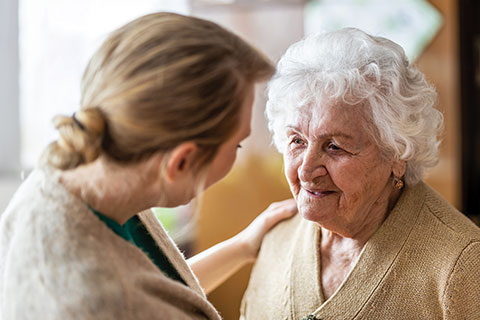Jewish Values
for Positive Aging
CJE SeniorLife Helps Older Adults and Their Families Live Well
In observance of Passover Holiday, CJE SeniorLife’s main office will be closed on the following days:
Monday, April 29 and Tuesday, April 30
Welcome to CJE SeniorLife
How Can We Help?
At CJE SeniorLife (CJE), we are passionate about serving older adults and those who love and care for them. For more than 50 years, we have offered a variety of services to meet the diverse needs and preferences of our clients, whether they live in our CJE communities or in their own homes. We empower older adults and their families to enjoy life to the fullest, with dignity and independence.
Our mission, vision and values guide our work every day. We listen to our clients and their families, and tailor our services to their unique situations, while adopting a holistic approach of collaborative and comprehensive care. Through our Hub for Care Coordination, our expert and compassionate staff applies an individualized approach with access to a full range of programs and services.
To learn more about how we can help you or your loved ones, please call our Concierge at 773.508.1000. We look forward to hearing from you.
SUPPORTIVE SERVICES
Caring Community
At CJE SeniorLife, we help older adults by carefully assessing their needs and expertly pairing them with CJE services and programs or our trusted network of professional partners. We have brought more innovative community-based services into the Chicago area than other providers of senior care, serving nearly 25,000 adults and their families each year.
WAYS TO HELP
Make a difference at CJE SeniorLife by giving your time, resources, or financial support
Donate
Make a Gift
CJE SeniorLife helps older adults live better EVERY DAY by providing enriching programs and vital services. We’ve been a leader in senior care for more than 50 years and we have no plans of stopping so we need your support.
VOLUNTEER
Get Involved
Hundreds of valued volunteers share their time and talents each year with our CJE SeniorLife community. Volunteer opportunities range from assembling and delivering meals to leading music programs or visiting residents and clients. Our goal is to make volunteering the best experience possible for everyone—especially you!
Contact Us
Welcome to CJE SeniorLife. How can we help?
At CJE SeniorLife, we’re committed to providing compassionate care, a full-range of essential services, and high-quality programs for seniors and their families. Our constant goal is to enhance quality of life and facilitate independence of older adults while offering caregiver information and support options.
We’re ready to answer your questions and help you make the right connections. Please submit the contact form to the right and someone from CJE will be in touch shortly.
If you have urgent questions, please call 773.508.1000.






